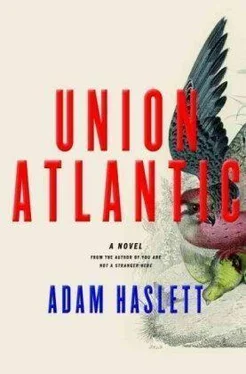“Where are you?” Sabrina asked.
“I don’t know. Twenty-eight, maybe. Twenty-nine.”
“Wow,” she said. “If you’re not careful, you might actually become interesting.”
From the office where he had wound up, Doug could see over Four Point Channel and across the corner of the harbor to the new federal courthouse with its slanting glass façade and a row of flags out front, fluttering in the breeze.
“So here’s the deal,” Sabrina said. “Holland wants you at the Ritz for the deal closing with Taconic; McTeague’s called three times; you’ve got a message from Mikey to contact him ASAP; the guy you hired to erase our e-mails says someone’s messing with his program; some official-sounding Chinese guy from the Singapore Exchange wanted to confirm your mailing address at eight this morning; Evelyn Jones is on vacation; and some kid named Nate called to say he was waiting for you ‘in the room.’ Which I’m not even going to touch. You think just maybe you could turn your phone on?”
In the last few weeks, Doug had begun to wander like this. Using the stairs, he’d head down to floors of the tower he’d never visited before, the reception areas distinguishable only by the pallor of the ferns and the colors of the abstract paintings hung over the leather chairs. Departments whose staff he could once have recited by name had doubled or tripled in size, filling whole floors. Nodding at the smiling secretaries, saying the occasional word to the middle managers surprised in the corridor, all of them as ignorant as could be of how untenable the bank’s predicament had become, he’d wind up in the office of someone down in consumer credit or government relations who was out for the day, and there he’d sit in the quiet with the door closed and his phone off, trying again and again to order his thoughts.
Through July and August the Nikkei index had shed another twelve hundred points; the Japanese Ministry of Finance, criticized for their earlier intervention, had done nothing to prevent the slide. McTeague’s losses had ballooned. They were larger now than the value of Atlantic Securities itself.
But then again, hardly anyone knew. If some deputy department head occasionally bothered to e-mail Doug, inquiring about loans from one division after another to an obscure subsidiary named Finden Holdings, he didn’t bother to reply. Even Holland seemed to have voided the problem from his mind, entertaining clients at Red Sox games and the Boston Pops and now finalizing the stock-only purchase of Taconic, the bank that had fallen on hard times back in the spring.
Union Atlantic’s customers still drew on lines of credit and made payments on existing loans. The insurance subsidiary still wrote policies and, after initially projecting large, 9/11-related losses, looked as if it might actually show a modest profit. People all over the country still opened checking accounts and paid bills and withdrew tens of millions in cash. On the Asian exchanges, there were rumors of a huge bet on the Nikkei but people figured it was a hedge fund in Connecticut or London, because, after all, banks wouldn’t expose that much of their own capital.
Indeed, the larger the problem grew the more routine the management of it had become. What had started as a crisis had turned into a condition. And then, just as the condition surpassed any previously imaginable level of acceptable seriousness, it seemed to vanish altogether, as if too big to see.
“You there?” Sabrina asked.
“Tell Holland I’m on my way.”
“What about the rest?”
“Tell that computer geek to work his shit out. I want those e-mails gone.”
“So dramatic. Can I shred something?”
“Piss off.”
“Maybe I’ll become one of those cooperating witnesses. I could write a memoir. I’m so sick of Franco. I had this whole idea about how to generate a subtle, almost perverse sympathy for him, but it all seems ridiculous now. I slept with this schlep in Watertown the other day. I tried taking his grandmother seriously, but in the end she was just an old Fascist. Who knows? My therapist says—”
Doug pressed End. He hadn’t moved his gaze from the courthouse façade. He had been in the building only once, with the general counsel for a hearing in a shareholder suit. Washington had spared no expense for the judges. From the marble floors to the courtrooms rimmed in arabesques of pink-and-blue pastel, you could be forgiven for expecting exhibitions of modern art rather than juries and sentencings.
To check the markets, he switched on the television in the corner, searching for the business channel. But before he reached it, he came upon those images that were constant now on cable news: the satellite photos of the Iraqi desert, still after still of warehouses and outbuildings surrounded by nothing but sand. Like all of them, this report was being narrated by some retired member of the brass paid to opine on the nature of the weapons hidden beneath all those roofs and tarps. Soon the screen cut to B roll of aircraft carriers and naval destroyers, as the old soldier described the slow but steady buildup of hardware in the theater. The segment ended with a shot of a tanker moving low in the water, as the news anchor, in a voice that somehow managed to blend excitement and resignation, reminded the audience of America’s vital interests in the region.
Lately, Doug couldn’t sleep for watching this stuff. And he knew Vrieger would be watching it too. Watching the endless repetition of facts and speculation and probable lies, the consumption of which at least partially numbed the helplessness of seeing it unfold at such distance and so inexorably. The two of them had spoken the previous week and Vrieger had told him that he was all set, headed to Virginia soon for training, the invasion apparently scheduled for March but plenty of contractors needed already for logistics and security, hundreds of them flowing into Kuwait each week.
In the small hours of the morning, Doug would lie awake staring at the maps with the fancy graphics of arrows sliding toward Baghdad from north, south, and west, as the commentators prattled on: neo-cons smugly suffering lesser minds, while their opponents expressed incredulity at the ignorance of the American people for supporting the idea of such a war; and then there were Doug’s favorites, the young, pro-war liberals, so fresh-faced and eager to prove they weren’t weak or queer. But whoever the commentators were, the reports seemed always to return to the endless stock footage of tanks kicking dust and missiles blasting hot off the decks of cruisers. Which carried Doug back, over and over, to standing on the deck of the Vincennes , that furnace wind blowing off the fouled waters of the Gulf, clogging the ship’s every pore with sand, and to the cursing of the Iranian thugs in the speedboats spit over the radio waves, and to watching the coordinates of the jetliner’s altitude rise across his monitor.
In the hours before dawn, when he finally managed to turn off the news, a mild delirium often took sway, a semiconscious but still-un-resting state, in which unremembered moments floated up into his senses, strangely complete in air and texture, almost dreamlike in their exactitude. Like sitting on the vinyl backseat of his uncle John’s station wagon between his cousins Michael and P.J. with the windows rolled down, thrilled to be out of his mother’s apartment and on the way out to the Cape, the voice on the radio calling the game as the miles of scrub pine blurred green across his eyes; and later, the deep, ineffable happiness of returning to his cousins’ house, a beautiful dusk place full of shouting and motion and the clutter of sports gear and toys, his uncle and aunt’s orders barked and ignored, Michael not turning off the hose but letting the water run all the way to the bottom of the drive, where they built their hurried dams for the pleasure of watching them overrun, glimpsing in his cousins’ casual disregard of their father’s rebukes the freedom that came with bossy parents — to resist, to push back against a strength and solidity your petty acts could never overcome.
Читать дальше












